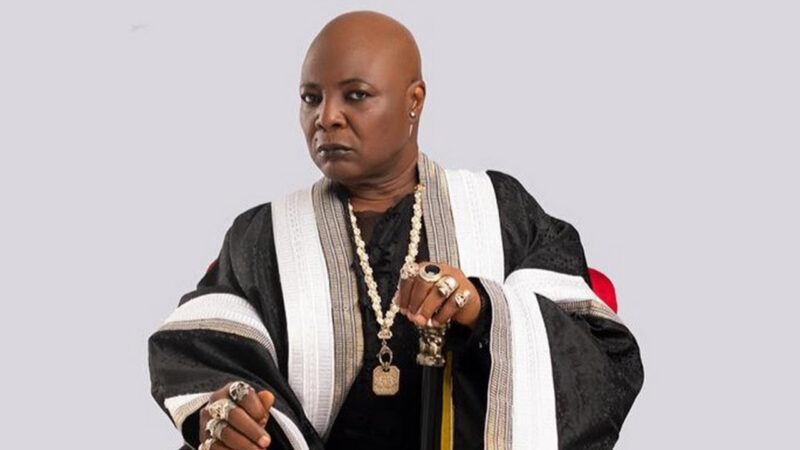Charly Boy, born Charles Oputa, has long been known for his rebellious spirit, his unconventional style, and his activism.
Lagos, Nigeria- Recently, during an interview on WithChude, the 73-year-old opened up about the turbulent relationship he had with his father, Justice Chukwudifu Oputa, and how his decision to pursue a career in music exacerbated their tension.
Charly Boy’s journey into music was not a smooth one, especially when it came to his family. After returning from the United States in the late 1970s, where he had studied Communication and Media Studies, Charly Boy found himself financially broke and disillusioned. He chose to move back to his ancestral village in Oguta, Imo State, where he spent seven years in poverty.
This phase in his life, according to Charly Boy, severely impacted his sense of self-worth. “I had disowned my parents. We were living in Owerri, and my parents moved to Lagos. I moved back to the village because I had just returned from America. I had no money, I had nothing. But that village robbed me of self-esteem,” he said. This period marked a significant low in his life, where he not only distanced himself from his family but also grappled with deep emotional and psychological struggles.
As the son of the revered Supreme Court Justice, Charly Boy’s decision to deviate from a traditional career path especially one in law or politics, created a deep rift between him and his father. Justice Oputa, known for his strong principles and discipline, could not understand his son’s passion for music, which was seen as an unconventional and unstable profession. Their differences weren’t just about Charly Boy’s career choice but extended into their day-to-day interactions.
Charly Boy revealed that from a young age, he always had a rebellious streak. He questioned the rigid structure his father imposed on their household, which included strict schedules for eating, praying, and other daily routines. “Why should my father be giving us commands like time to eat, time to pray, and all of that? I was just so tired of all that. It did not make sense to me,” he shared.
This defiance often led to punishments, with Charly Boy recalling that he was frequently whipped and disciplined more than his siblings. “I was the one that was punished the most because I would not do what I was asked to do,” he admitted.
Despite the friction, Charly Boy acknowledged that his father had instilled in him a crucial lesson: to question everything and seek the truth. This principle of “query and investigate everything” was at the core of many of their disagreements.
Charly Boy’s refusal to conform to societal expectations and his desire to forge his own path whether through his music, activism, or lifestyle choices was rooted in this lesson from his father, even though it often placed them at odds.
The tension between father and son eventually reached a turning point after years of vocal battles and heated exchanges. Charly Boy shared a particularly transformative moment that reshaped their relationship.
During a tense conversation, instead of reacting to his father’s anger as he normally would, Charly Boy chose a different approach. “One day, I came to him as usual to talk about something close to my mind. He started screaming and shouting and I did not shout back. I did not say anything. I listened to him very attentively,” he recalled. His father was surprised by his son’s calm demeanor and lack of reaction.
After his father finished, Charly Boy calmly asked, “Daddy, I have listened to you, can you listen to me now?” This moment, according to Charly Boy, marked a turning point in their relationship. “That was the last day he shouted at me. That was the day everything changed because I found a new way of dealing with this man.”
In later years, their relationship continued to evolve, with Charly Boy taking on the responsibility of caring for his aging parents. After Justice Oputa retired, Charly Boy brought both his parents to live with him in Abuja, where they stayed for nearly 15 years until their deaths. Reflecting on this period, he described it as one of the most significant roles of his life. “The greatest job I had was to take care of them,” he said.
Charly Boy’s music career, which began in 1982, further solidified his identity as a nonconformist and cultural icon. His 1988 album 1990 was particularly famous for its bold political commentary, addressing the corruption and mismanagement of Nigeria’s military government at the time. The album predicted that the government, which was supposed to hand over power to civilians that year, would renege on its promise, a prediction that turned out to be true.
By the late 1980s, Charly Boy had crafted a new persona: an edgy, punk-inspired figure who defied Nigeria’s conservative societal norms. He embraced leather jackets, power bikes, mohawks, and bold jewelry, alongside a blend of African pop and Afrobeat music.
His controversial style, which included wearing makeup, braided hairstyles, and rings, drew both admiration and criticism. His androgynous fashion choices and penchant for what was dubbed “women’s clothing” challenged the rigid gender norms of the time, cementing his reputation as a fearless boundary-pusher.
Today, Charly Boy remains one of Nigeria’s most enigmatic figures, known not only for his music but also for his activism, particularly in the areas of human rights, governance, and social justice.










Join our Channel...